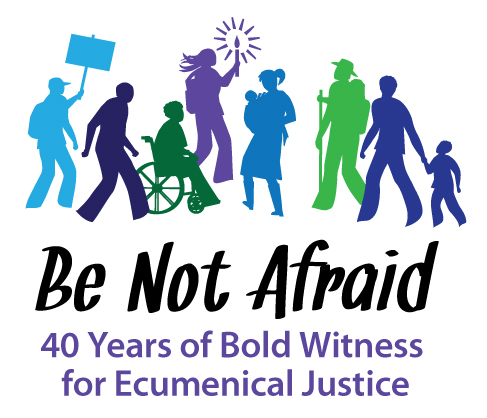Be Not Afraid – By John Dillon
Theological Reflection – Sunday May 5, 2013
John Dillon is a native of Sarnia, Ont., and graduated from the University of Western Ontario in 1970. He began work in Toronto in 1973 as a researcher with GATT-Fly (later Ecumenical Coalition for Economic Justice), one of KAIROS’ predecessor coalitions. John is currently Economic Justice Program Coordinator at KAIROS in Toronto.
 “Do not let your hearts be troubled, and do not let them be afraid.” John 14:27
“Do not let your hearts be troubled, and do not let them be afraid.” John 14:27
In John’s gospel Jesus addresses these words to his disciples as he gives them his final farewell after the Last Supper and just before departing for the garden of Gethsemane. The counsel to have no fear recurs many times throughout the scriptures beginning in the book of Genesis where God reassures Abraham (Gn 15:1) Isaac (Gn 26:24) and Jacob (Gn 46:3) that they need not have fear because “I will be with you.”
The theme recurs in the book of Numbers where God instructs Moses to send twelve envoys from among the tribes wandering in the desert into Canaan to reconnoitre the promised land. When ten of these envoys report back they express real fear of the people they encountered there: “The country we went to reconnoitre is a country that devours its inhabitants. Every man we saw there was of an enormous size. Yes, and we saw giants there … We felt like grasshoppers, and so we seemed to them.” (Nb 13:32-33)
Reading this description, the transnational oil and mining corporations come to mind. I certainly think of them as powerful giants and wonder if we don’t seem to them to be as small as grasshoppers.
What happens next in the story is that two other of the envoys, Joshua and Caleb, have to quell a rebellion among those who would turn back to Egypt by reminding them not to be afraid because God will accompany them into the promised land. (Nb 14:1-9) Then God punishes the ten envoys, not for cowardice but for their lack of faith in God’s promises. They are condemned to die in the wilderness and their children to wander as nomads for 40 years while only Joshua and Caleb and their families are allowed to enter the promised land. (Nb 14:27-38)
In the vocation narratives for both Jeremiah and Ezekiel, God tells each of these prophets not to be afraid of those to whom they are sent to speak God’s truth, “for I am with you to protect you.” (Jr 1:8) In Ezekiel’s case the prophet’s own salvation is dependent on whether or not he conveys God’s warnings “whether they listen or not.” (Ezk 2:5; 17-21)
I wonder how often do I shy away from speaking out against injustice or the destruction of the natural world because I fear the perpetrators whom I perceive to be very strong and unlikely to listen. Am I too timid for fear of their reprisals?
Am I too timid because I don’t want to give up my comfortable lifestyle? In the gospel of Luke we are warned against seeking first our own security and comfort. There we are told not to be afraid to give up our quest to accumulate worldly goods because our reward is nothing less than God’s own realm of justice, peace and integral creation. (Lk 12:32)
In our day God has raised prophets who are standing up against exploitation and ecological destruction by corporate giants. Many of these brave souls are willing to be arrested, fined and imprisoned for acts of non-violent civil disobedience such as the protests against the Keystone XL tar sands pipeline. They are not afraid to make sacrifices in the fight for social and ecological justice.
I ask myself whether I have the courage to join them. Do I take seriously what I have written about how further exploitation of the tar sands not only violates the rights of Indigenous peoples but also threatens life on Earth through runaway climate change? Is it lack of courage that holds me back? Or is it a lack of faith in God’s promises?








